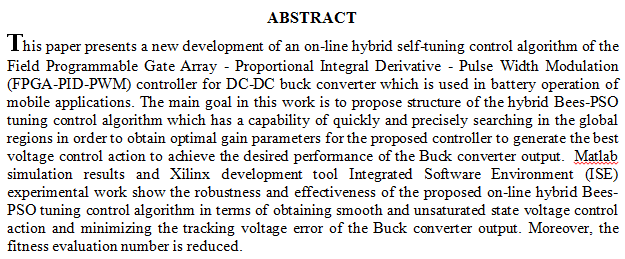
Abstract
The aim of the research is to identify the effect of using the self-questioning strategy on the achievement of fourth-grade students in science and the development of their reflective thinking in physics in the city of Baghdad. The research sample was divided into two groups: an experimental group of (20) students and a control group of (20) students. The researchers developed two tools: a test of (40) multiple-choice questions. The second tool is a test to measure the reflective thinking skills of fourth-grade students. It consists of (25) multiple-choice questions distributed on skills as follow: reflection and observation, detection of inaccuracies, reaching conclusions, giving clear explanations, an
... Show MoreIncremental sheet metal forming is a modern technique of sheet metal forming in which a uniform sheet is locally deformed during the progressive action of a forming tool. The tool movement is governed by a CNC milling machine. The tool locally deforms by this way the sheet with pure deformation stretching. In SPIF process, the research is concentrate on the development of predict models for estimate the product quality. Using simulated annealing algorithm (SAA), Surface quality in SPIF has been modeled. In the development of this predictive model, spindle speed, feed rate and step depth have been considered as model parameters. Maximum peak height (Rz) and Arithmetic mean surface roughness (Ra) are used as response parameter to assess th
... Show More (2)
(2)
 (34)
(34)
 (30)
(30)
Ultraviolet photodetectors have been widely utilized in several applications, such as advanced communication, ozone sensing, air purification, flame detection, etc. Gallium nitride and its compound semiconductors have been promising candidates in photodetection applications. Unlike polar gallium nitride-based optoelectronics, non-polar gallium nitride-based optoelectronics have gained huge attention due to the piezoelectric and spontaneous polarization effect–induced quantum confined-stark effect being eliminated. In turn, non-polar gallium nitride-based photodetectors portray higher efficiency and faster response compared to the polar growth direction. To date, however, a systematic literature review of non-polar gallium nitride-
... Show More (24)
(24)
 (26)
(26)
Shadow removal is crucial for robot and machine vision as the accuracy of object detection is greatly influenced by the uncertainty and ambiguity of the visual scene. In this paper, we introduce a new algorithm for shadow detection and removal based on different shapes, orientations, and spatial extents of Gaussian equations. Here, the contrast information of the visual scene is utilized for shadow detection and removal through five consecutive processing stages. In the first stage, contrast filtering is performed to obtain the contrast information of the image. The second stage involves a normalization process that suppresses noise and generates a balanced intensity at a specific position compared to the neighboring intensit
... Show More (2)
(2)
 (2)
(2)
 (105)
(105)
 (102)
(102)
This paper presents a study of the application of gas lift (GL) to improve oil production in a Middle East field. The field has been experiencing a rapid decline in production due to a drop in reservoir pressure. GL is a widely used artificial lift technique that can be used to increase oil production by reducing the hydrostatic pressure in the wellbore. The study used a full field model to simulate the effects of GL on production. The model was run under different production scenarios, including different water cut and reservoir pressure values. The results showed that GL can significantly increase oil production under all scenarios. The study also found that most wells in the field will soon be closed due to high water cuts. Howev
... Show MoreL1 adaptive controller has proven to provide fast adaptation with guaranteed transients in a large variety of systems. It is commonly used for controlling systems with uncertain time-varying unknown parameters. The effectiveness of L1 adaptive controller for position control of single axis has been examined and compared with Model Reference Adaptive Controller (MRAC). The Linear servo motor is one of the main constituting elements of the x-y table which is mostly used in automation application. It is characterized by time-varying friction and disturbance.
The tracking and steady state performances of both controllers have been assessed fo
... Show MoreThe aim of this study is to compare the effects of three methods: problem-based learning (PBL), PBL with lecture method, and conventional teaching on self-directed learning skills among physics undergraduates. The actual sample size comprises of 122 students, who were selected randomly from the Physics Department, College of Education in Iraq. In this study, the pre- and post-test were done and the instruments were administered to the students for data collection. The data was analyzed and statistical results rejected null hypothesis of this study. This study revealed that there are no signifigant differences between PBL and PBL with lecture method, thus the PBL without or with lecture method enhances the self-directed learning skills bette
... Show MoreOil industry played a major role in delineating the course and type o development in both imported and exported Arabic countries alike where its revenues has perform an essential role in forming programs and plans of development on both national and international level in addition to anticipation of future consuming.
Iraq, as an oil producer country with a revenues –based economy depends on oil in building its economy totally including its infrastructure having a the greatest conformed reservoir which make the government budget depends largely on oil revenues where its strategic importance lies in funding all aspects of expenders as it is considered the prime source of foreign currency. The chall
... Show More